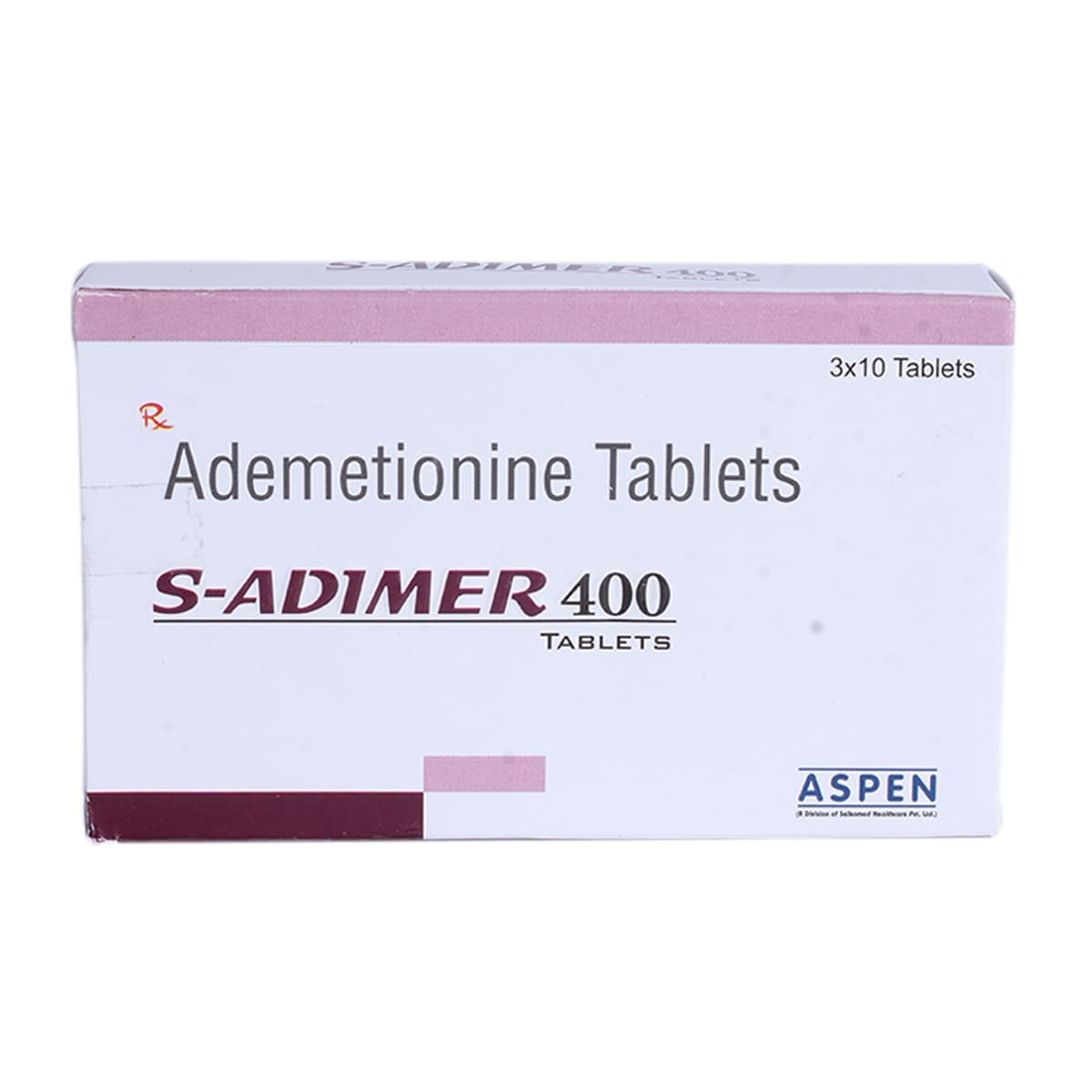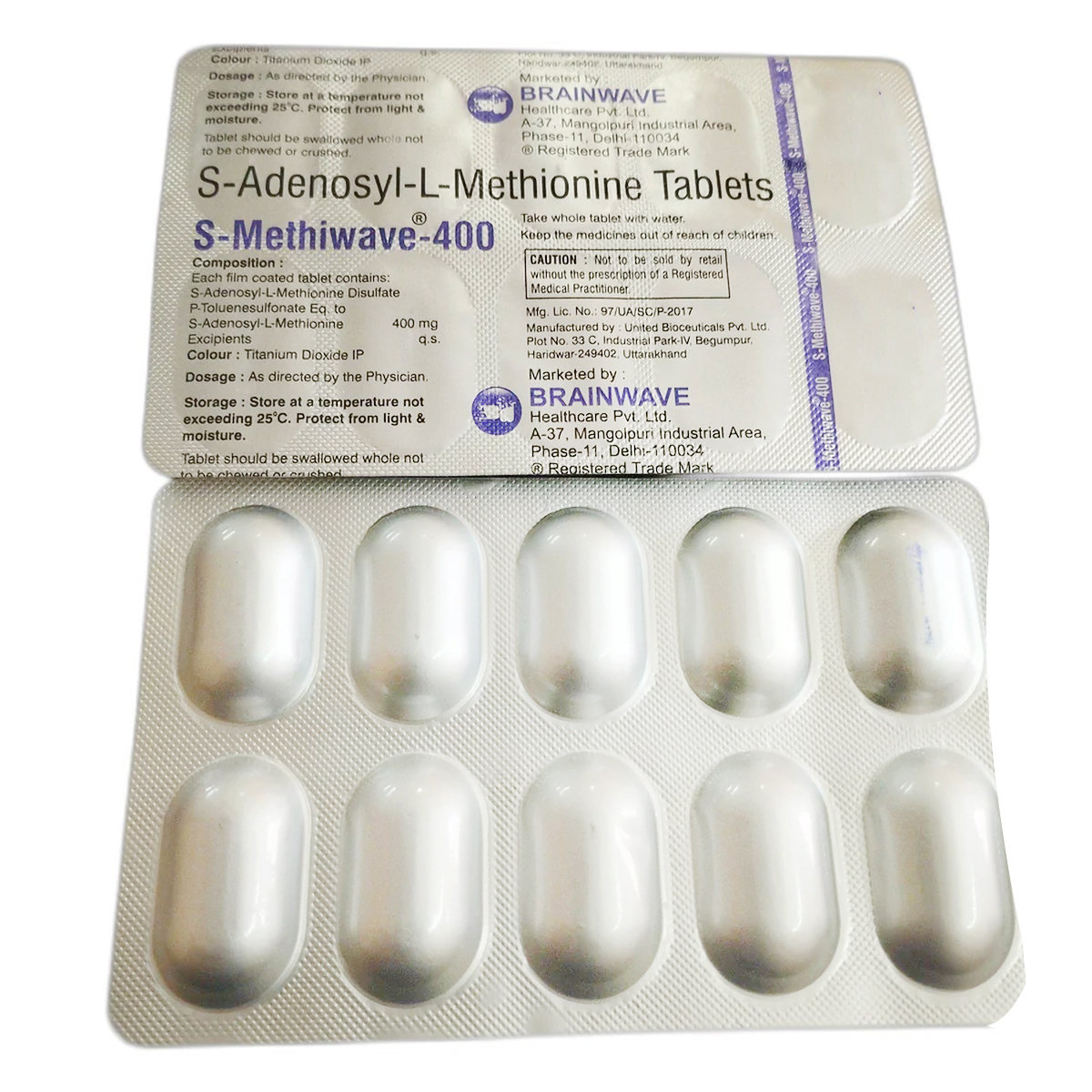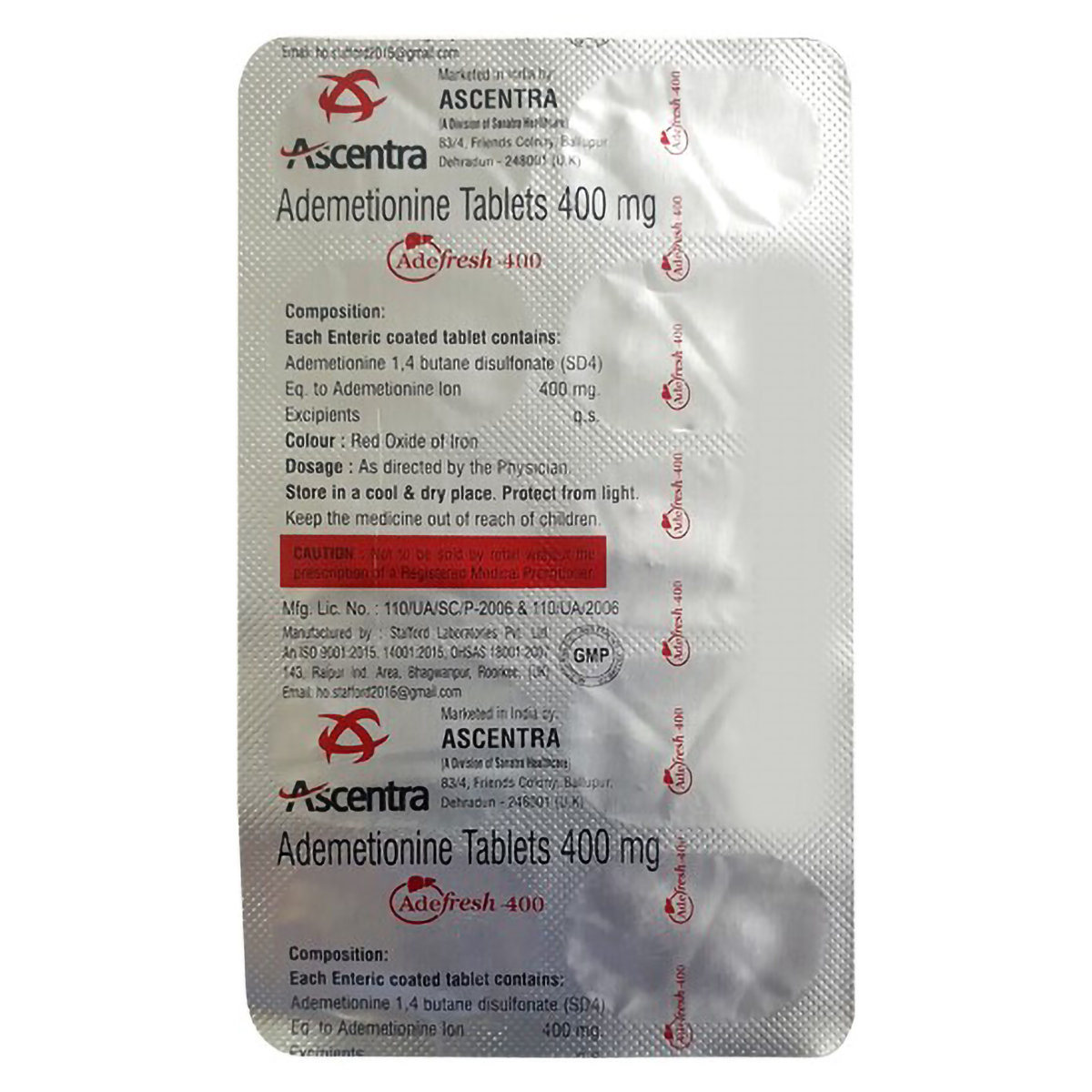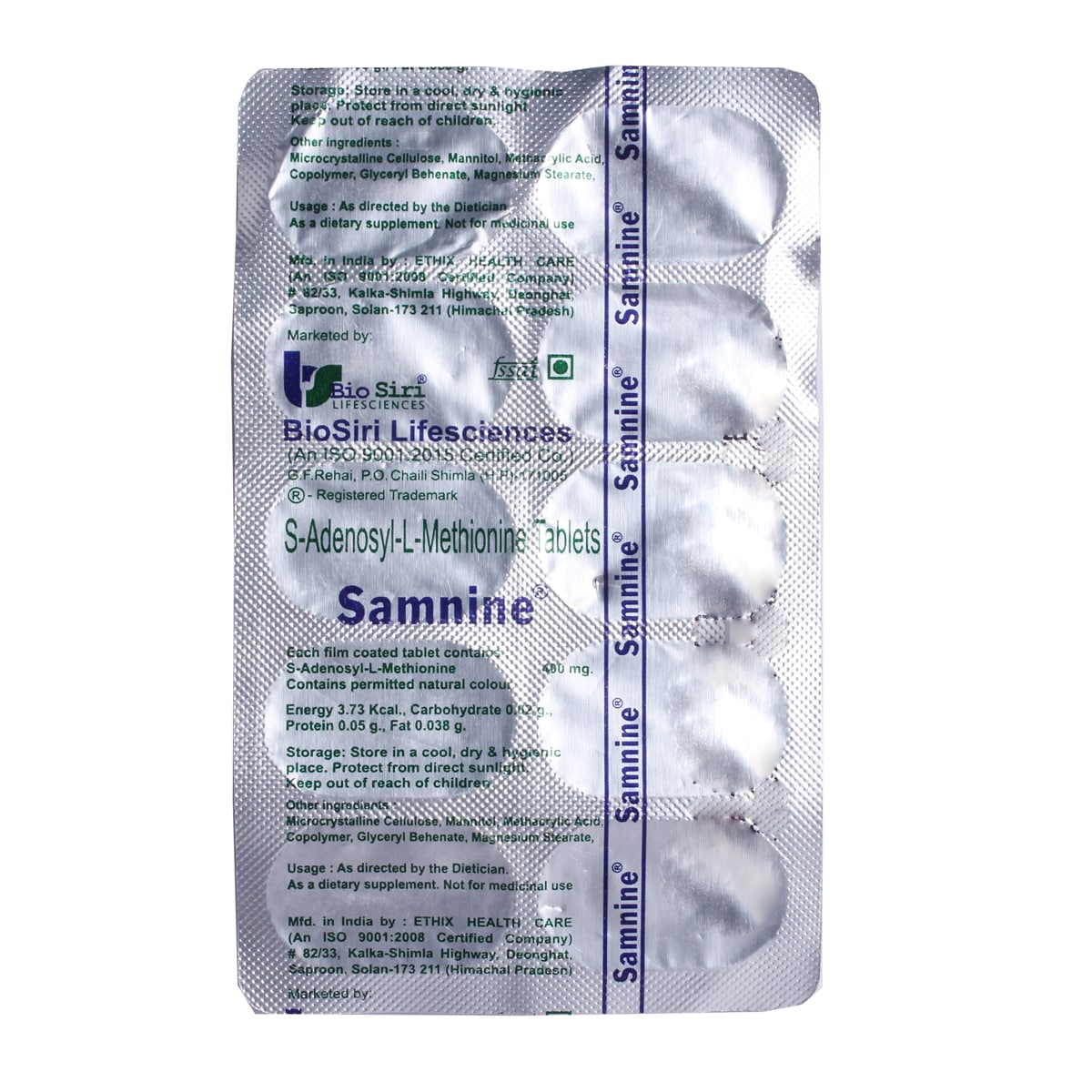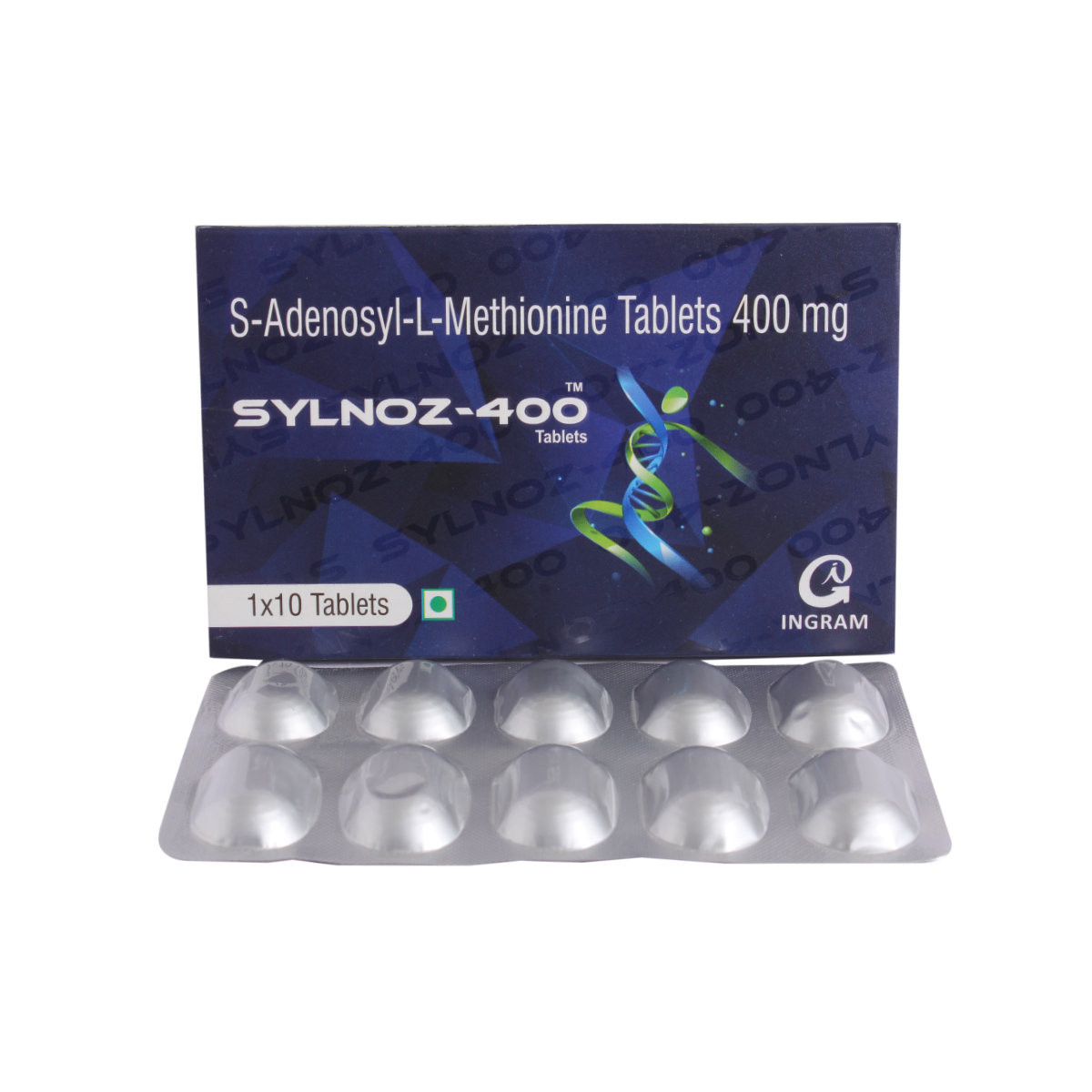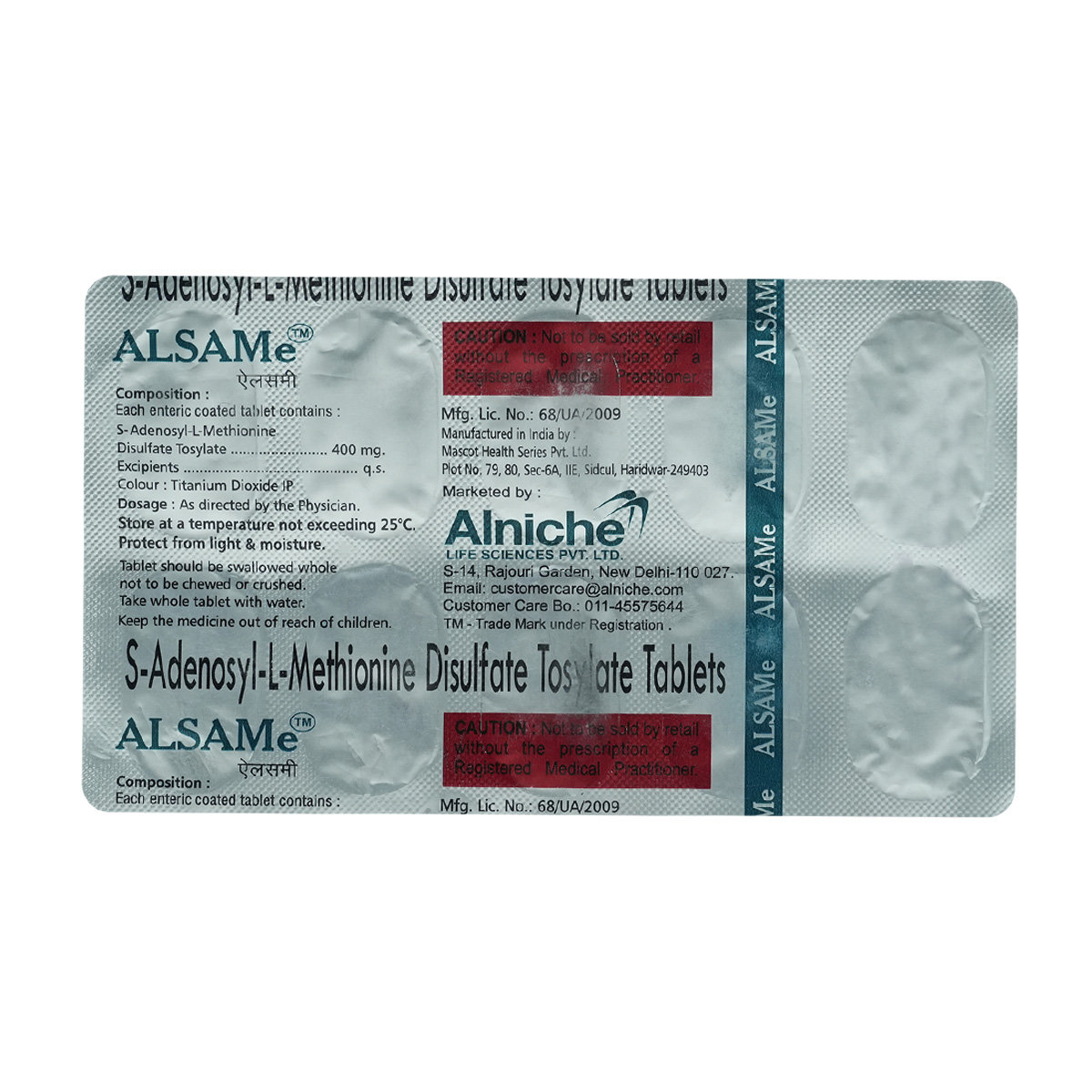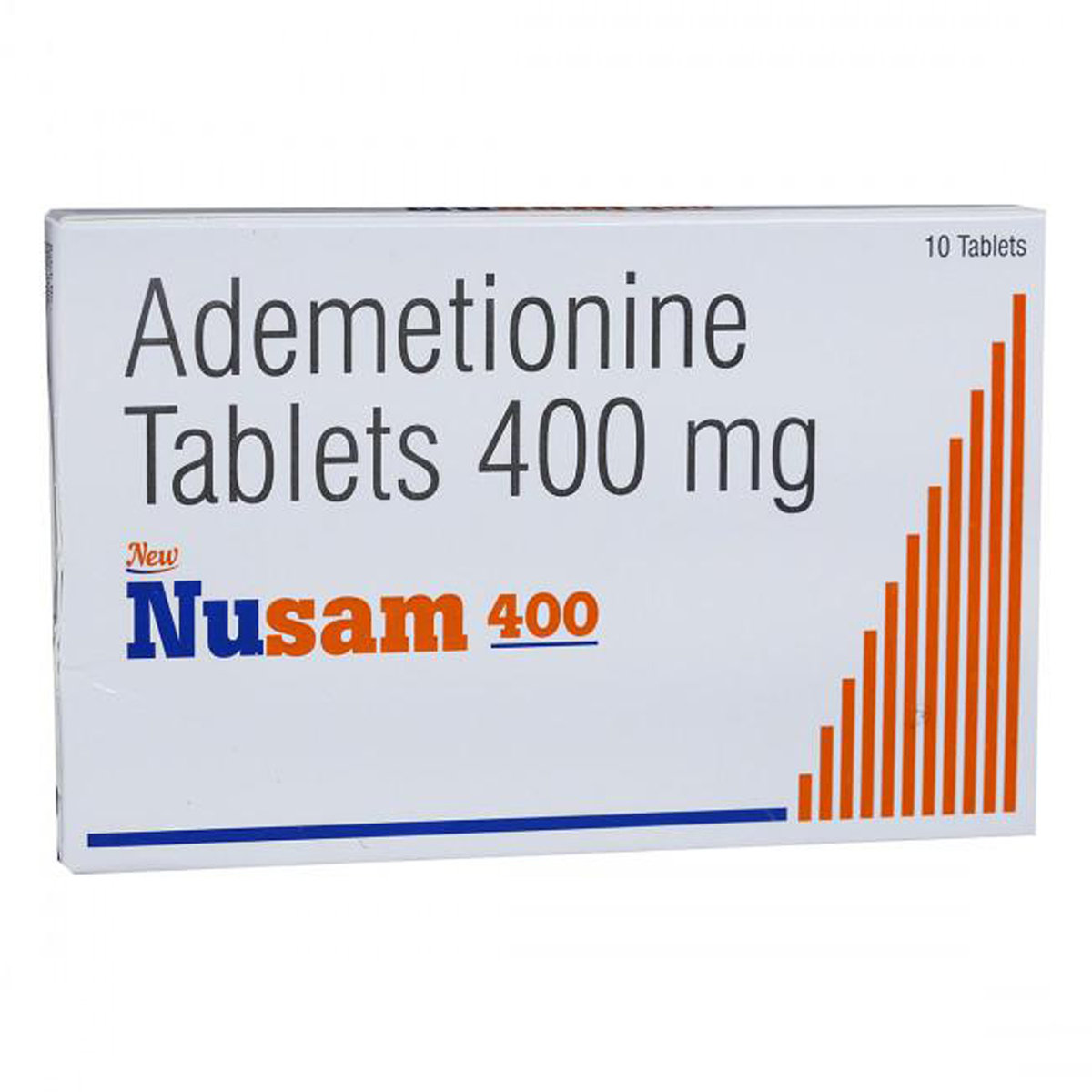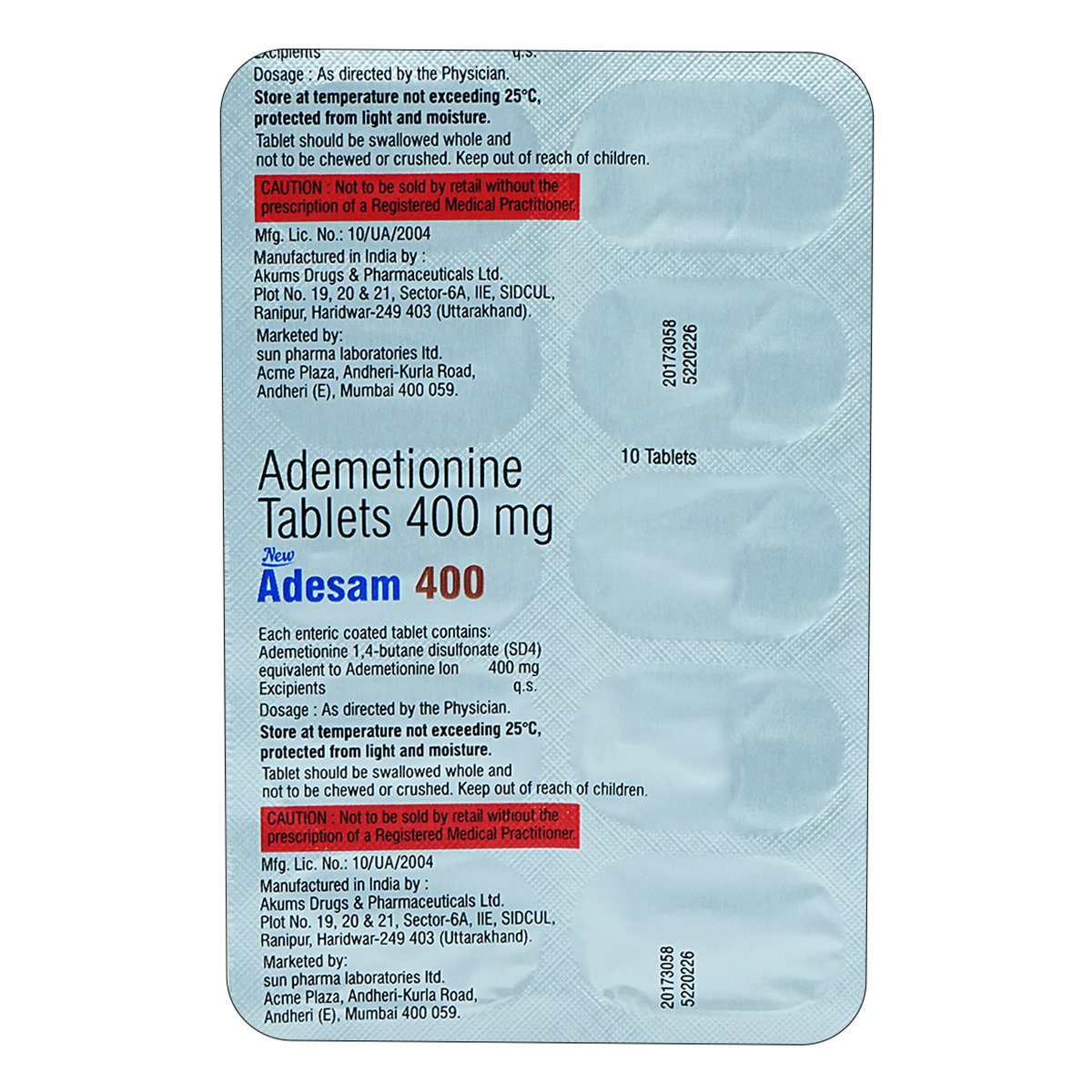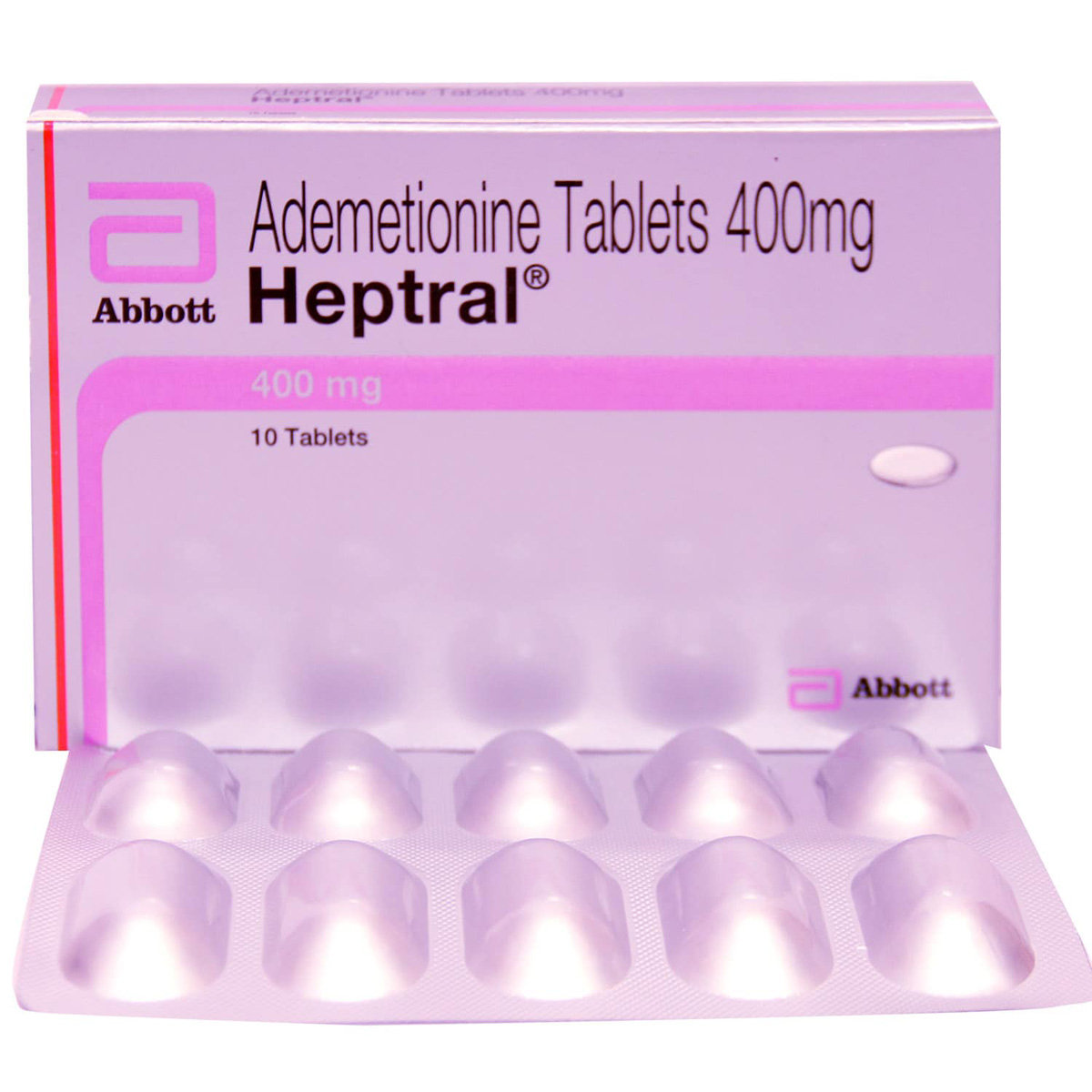Medanosyl 400 mg Tablet 10's
MRP ₹778
(Inclusive of all Taxes)
₹116.7 Cashback (15%)
Provide Delivery Location
Online payment accepted
 Prescription drug
Prescription drugWhats That
Composition :
Manufacturer/Marketer :
Consume Type :
Expires on or after :
Return Policy :
About Medanosyl 400 mg Tablet
Medanosyl 400 mg Tablet belongs to the class of medication called Nutritional supplements used to treat various medical conditions, including depression, reduce pain and swelling in the joints conditions such as osteoarthritis, biliary cholangitis (an autoimmune disease of the liver), excess cholesterol in bile and biliary and liver diseases caused by cystic fibrosis. It is also used to treat liver disease during pregnancy, improve symptoms in people with fibromyalgia, and treat nerve problems in people with AIDS or sexual dysfunction in men with depression.
Medanosyl 400 mg Tablet contains Ademetionine, a naturally occurring substance found in cells, tissue, and body fluids. It is produced from methionine (amino acid) and is used to treat liver disease, depression, and osteoarthritis. Medanosyl 400 mg Tablet ensures sufficient levels of glutathione in the liver are maintained to minimize liver damage. It also prevents the increase of lipids associated with cirrhosis outside the liver. It also affects certain chemical messengers (serotonin) in the brain, which communicate between brain cells, regulating mood and treating depression. It stimulates the production of parts of cartilage, reduces the inflammatory mediator, and has painkilling properties.
Take Medanosyl 400 mg Tablet as recommended by your doctor. In some cases, you may experience common side-effects such as abdominal discomfort, abdominal pain, diarrhoea, nausea, dizziness, and insomnia. Most of these side effects do not require medical attention and will resolve gradually over time. However, you are advised to talk to your doctor if you experience these side effects persistently.
Do not discontinue Medanosyl 400 mg Tablet without consulting your doctor. Do not take Medanosyl 400 mg Tablet if you are pregnant or breastfeeding unless advised. Medanosyl 400 mg Tablet can be given to children with extreme caution if recommended by the doctor. Avoid consuming alcohol with Medanosyl 400 mg Tablet as it could lead to increased drowsiness and liver damage. Keep your doctor informed about your health condition and medicines to rule out any side effects.
Uses of Medanosyl 400 mg Tablet
Directions for Use
Key Benefits
The Medanosyl 400 mg Tablet contains Ademetionine, a naturally occurring substance in cells, tissue, and body fluids. It is produced from methionine (amino acid) and is used to treat liver disease, depression, and osteoarthritis. In liver disease, Medanosyl 400 mg Tablet ensures sufficient glutathione levels in the liver to minimize liver damage. It also prevents the increase of lipids associated with cirrhosis outside the liver. In depression, it affects certain chemical messengers (serotonin) in the brain, which communicate between brain cells, thereby regulating mood and treating depression. In osteoarthritis, It stimulates the production of cartilage parts, reduces the inflammatory mediator, and has painkilling properties. Medanosyl 400 mg Tablet is also effective in treating liver disease during pregnancy, improving symptoms in fibromyalgia, treating nerve problems in people with AIDS, or sexual dysfunction in men with depression.
Storage
- If you experience signs of skin allergies such as redness, itching, or irritation after taking medication, contact your doctor right away.
- To alleviate skin allergy symptoms, your doctor may change your medication regimen or offer tailored medication management advice.
- Your doctor may recommend or prescribe drugs to relieve discomfort.
- Cool compresses or calamine lotion can help relieve redness and itching on the afflicted skin area.
- Staying hydrated by consuming plenty of water can help relieve discomfort.
- Monitor your skin condition closely and promptly report any changes, worsening symptoms, or concerns to your healthcare provider.
- Contact your doctor immediately if you're experiencing a fast heart rate, palpitations, or other heart-related symptoms. This is crucial to determine whether the symptoms are related to your medication.
- Your doctor may need to adjust your medication regimen to alleviate the fast heart rate symptoms. This could involve changing the medication, reducing the dosage, or adding new medications to counteract the side effects.
- Follow your doctor's advice on monitoring your heart rate and blood pressure. This will help track any changes and ensure your heart rate returns normal.
- If you experience severe symptoms such as chest pain, dizziness, or shortness of breath, seek immediate medical attention. These symptoms can indicate a more serious condition that requires prompt treatment.
- Exercising regularly helps lower the risk of heart problems.
- Maintain a healthy diet, including vegetables and fruits.
- Rest well; get enough sleep.
- Manage stress with yoga and meditation.
- Limit alcohol and smoking.
- Swelling of the throat can worsen if there is no proper rest for your throat.
- Drink plenty of warm fluids and frequently gargle with salt water.
- Humidify the surrounding air using a humidifier, as dry air may increase dryness and throat pain.
- Talk to your doctor if the swelling bothers you while swallowing food.
- Take enough rest and stay in warm places to reduce pain quickly.
- Tell your doctor immediately if you experience shortness of breath after taking medication.
- Your doctor may adjust the medication regimen or dosage or give alternative medical procedures to minimize the symptoms of shortness of breath.
- Monitor your oxygen levels and breathing rate regularly to track changes and potential side effects.
- For controlling stress and anxiety, try relaxation techniques like deep breathing exercises, meditation, or yoga.
- Make lifestyle changes, such as quitting smoking, exercising regularly, and maintaining a healthy weight.
- Seek emergency medical attention if you experience severe shortness of breath, chest pain, or difficulty speaking.
- Follow up regularly with your doctor to monitor progress, adjust treatment plans, and address any concerns or questions.
- Talk to your doctor about your back pain and potential medication substitutes or dose changes.
- Try yoga or Pilates and other mild stretching exercises to increase flexibility and strengthen your back muscles.
- To lessen the tension on your back, sit and stand upright and maintain proper posture.
- To alleviate discomfort and minimize inflammation, apply heat or cold packs to the afflicted area.
- Under your doctor's supervision, think about taking over-the-counter painkillers like acetaminophen or ibuprofen.
- Make ergonomic adjustments to your workspace and daily activities to reduce strain on your back.
- To handle tension that could make back pain worse, try stress-reduction methods like deep breathing or meditation.
- Use pillows and a supportive mattress to keep your spine in the right posture as you sleep.
- Back discomfort can worsen by bending, twisting, and heavy lifting.
- Speak with a physical therapist to create a customized training regimen to increase back strength and flexibility.
- Inform your doctor about dizziness symptoms. They may adjust your medication regimen or prescribe additional medications to manage symptoms.
- Follow your doctor's instructions for taking medication, and take it at the same time every day to minimize dizziness.
- When standing up, do so slowly and carefully to avoid sudden dizziness.
- Avoid making sudden movements, such as turning or bending quickly, which can exacerbate dizziness.
- Drink plenty of water throughout the day to stay hydrated and help alleviate dizziness symptoms.
- If you're feeling dizzy, sit or lie down and rest until the dizziness passes.
- Track when dizziness occurs and any factors that may trigger it, and share this information with your doctor to help manage symptoms.
Drug Warnings
Do not take Medanosyl 400 mg Tablet if you are allergic to any of its contents, if you have used an MAO inhibitor in the past 14 days, if the inflammation of gall bladder and bile ducts, narrowing or blockage of bile ducts, biliary colic, calcified gallstones, improper constriction of the gallbladder, gastric or duodenal ulcer. Inform your doctor if you have heart disease, seizure disorders, bone marrow suppression, diabetes, schizophrenia, bipolar disorder, acute alcohol intoxication, glaucoma, thyroid problems, or kidney and liver problems. Do not take Medanosyl 400 mg Tablet if you are pregnant or breastfeeding unless advised by your doctor. Medanosyl 400 mg Tablet can be given to children with caution if recommended by the doctor. Avoid consuming alcohol along with Medanosyl 400 mg Tablet as it could lead to increased drowsiness and liver damage. Keep your doctor informed about your health condition and medicines to rule out any unpleasant side effects.
Drug-Drug Interactions
Drug-Drug Interactions
Login/Sign Up
Drug-Food Interactions
Drug-Food Interactions
Login/Sign Up
Diet & Lifestyle Advise
Liver disease:
- Include foods such as bell peppers, citrus fruits, leafy vegetables, tomatoes, milk, fish, low-fat dairy, beans, nuts, lentils, tofu, and tempeh in your diet.
- Foods rich in vitamins B and C and calcium are good for the gallbladder.
- Plant-based protein foods such as beans, nuts, lentils, tofu, and tempeh help prevent gallbladder disease.
- Avoid high-fat, trans-fat, processed foods, white bread, white pasta, and sugars.
- Avoid tobacco and alcohol consumption.
Depression:
- Maintaining a healthy diet and regular exercise helps improve overall health and boost self-esteem.
- Perform meditation and yoga. This helps in relieving stress and provides relaxation.
- Follow a regular sleep pattern to improve the amount and quality of sleep you get.
- Include foods rich in omega fatty acids such as fish, nuts, fresh fruits, vegetables, and olive oils.
- Neurotransmitters are made up of amino acids. Amino acid-rich foods such as meat, dairy products, and certain fruits and vegetables help properly maintain neurotransmitters.
- Avoid smoking and alcohol consumption.
Osteoarthritis:
- Physical activity helps strengthen muscles and relieves joint stiffness. Gentle activities like 20-30minutes of walking or swimming would be helpful.
- Performing yoga may also help in improving joint flexibility and pain management.
- Follow heat or cold therapy, and apply a cold or hot compress on the joints for 15-20minutes regularly.
Side Effects of Medanosyl 400 mg Tablet
- Headache
- Dizziness
- Feeling anxious
- Vomiting
- Stomach upset
- Diarrhoea
- Constipation
- Insomnia (sleep problem)
- Increased sweating
Habit Forming
Therapeutic Class
All Substitutes & Brand Comparisons
RX
S-Adimer-400 Tablet 10's
Seikomed Healthcare Pvt Ltd
₹675
(₹60.75 per unit)
13% CHEAPERRX
S-Methiwave 400 Tablet 10's
Brainwave Healthcare Pvt Ltd
₹675
(₹60.75 per unit)
13% CHEAPERRX
Adnometh S Tablet 10's
AAA Pharma Trade Pvt Ltd
₹702
(₹63.18 per unit)
9% CHEAPER
Author Details
We provide you with authentic, trustworthy and relevant information
Drug-Diseases Interactions
Drug-Diseases Interactions
Login/Sign Up
FAQs
Drug-Drug Interactions Checker List
- MOCLOBEMIDE
- PHENELZINE
- IPRONIAZID
- ISOCARBOXAZID
- NIALAMIDE
- TRANYLCYPROMINE
- SELEGILINE
- BUPROPION
- DULOXETINE
- FLUOXETINE
- SERTRALINE
- LEVODOPA
- TRAMADOL
- TRAZODONE
- HYDROCODONE
- OXYCODONE
- ACETAMINOPHEN
Special Advise
- Your doctor may advise a regular liver function test to monitor the liver's function and the treatment progress.
- Do not use Medanosyl 400 mg Tablet if you have used an MAO inhibitor (antidepressant) in the past 14 days, as a dangerous drug interaction could occur.
Disease/Condition Glossary
Primary biliary cholangitis: Primary biliary cholangitis, formerly known as primary biliary cirrhosis, is an autoimmune disease caused by bile duct damage in the liver. Bile ducts are the small channels that carry the bile (digestive fluid) from the liver to the small intestine, where it breaks down fats and aids in its absorption. Biliary cirrhosis causes a build-up of bile in the liver, which leads to liver damage.
Depression: Depression is a mood disorder characterized by sadness, unhappiness, anger, hopelessness, or loss that interferes with a person’s daily activities. Depression can also influence some chronic health conditions and relationships. The exact cause of depression is unknown, but it may be associated with mental problems, trauma, family history, drug use, and medical conditions.
Osteoarthritis: Osteoarthritis is a degenerative joint disease in which the two ends of the joints come together due to the breakdown of a protective covering of cartilage. Due to the absence of this protective covering, the joints rub against each other, leading to pain and stiffness. Symptoms of osteoarthritis include pain, stiffness, inflammation, and tenderness. The main reason for osteoarthritis is age. The older you are, the more likely you could get osteoarthritis, thus known as degenerative disease, meaning that the joints wear out as a person ages. Other reasons include a past injury such as torn cartilage, dislocated joints, and ligament injuries.

Have a query?
Alcohol
Safe if prescribed
Avoid consumption of alcohol while taking Medanosyl 400 mg Tablet as it may cause increased dizziness and liver damage.
Pregnancy
Consult your doctor
Avoid taking Medanosyl 400 mg Tablet if you are pregnant unless advised by a doctor. Please consult your doctor if you have any concerns regarding this, your doctor will recommend only if the benefits outweigh the risks.
Breast Feeding
Consult your doctor
Consult your doctor before taking Medanosyl 400 mg Tablet , your doctor will decide whether Medanosyl 400 mg Tablet can be taken by breastfeeding mothers or not.
Driving
Safe if prescribed
Medanosyl 400 mg Tablet does not affect your ability to drive. However, you are advised to be cautious while driving if you experience dizziness.
Liver
Consult your doctor
Dose adjustment may be needed in patients with liver impairment. Please consult your doctor if you have a liver impairment or any concerns regarding this.
Kidney
Consult your doctor
Dose adjustment may be needed in patients with kidney impairment. Please consult your doctor if you have kidney impairment or any concerns regarding this.
Children
Safe if prescribed
Medanosyl 400 mg Tablet can be given to children with caution only if recommended by the doctor.




